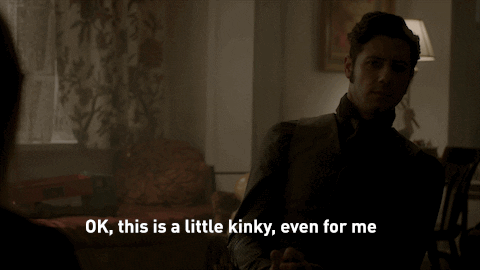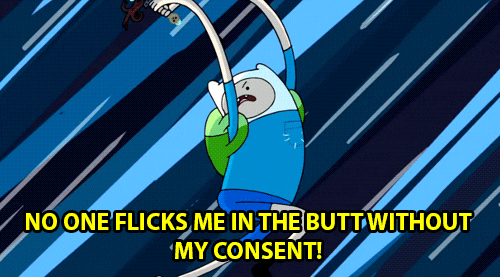From the statement on our about page to the Slutty Girl’s Manifesto, if there’s one theme that ties together every post on Slutty Girl Problems, it’s sex-positivity. The phrase “sex-positive” might sound like a simple philosophy that promotes sex as good, healthy, and natural. However, the movement is about so much more than that. According to Wikipedia, “The sex-positive movement is a social movement which promotes and embraces sexuality with few limits beyond an emphasis on safe sex and the importance of consent”.
Sex is always part of the conversation, whether you are watching a tabloid, making conversation with your friends, or even watching the world news. With so much discussion about sex in the media, particularly scrutiny concerning women’s sexuality and rights, remaining sex-positive can seem difficult at times. This is especially true when taking into account that the movement is about more than accepting your own sexuality but also about accepting the needs and desires of others. What are some ways to remain sex-positive on a daily basis?
1. Recognize that having sex is healthy.
Sex can, at times, feel shameful and embarrassing. Whether you were raised in a religious or otherwise strict culture or not, sex is a taboo. Some of what’s so illicit about sex is what makes it, well, sexy. However, the censorship and awkwardness inherent to the subject are completely unnecessary. Sex is completely natural and a very important part of life. Hell – it’s what creates life! Even beyond that, there are so many benefits associated with sex. According to WebMD, sex eases stress, helps you sleep, relieves pain, boosts your immune system, and even counts as exercise. Beyond the health benefits, sex is a great way to make you feel close to your partner and boost your mood.
2. Not having sex is also healthy.
There are so many different reasons a person might choose not to have sex. The most obvious that comes to mind is abstinence. Often people are abstinent due to religious beliefs, but there may be other reasons for their celibacy. If a person does not feel comfortable or safe during sex or within their sexuality, choosing to not have sex might be the best option. Celibacy and abstinence are completely valid choices as long as you are aware of the other methods of preventing pregnancy and STDs.
Another reason a person might choose not have sex is due to their sexuality. Often when describing sexual attraction, people are defined as either gay or straight. Sometimes bisexuality is brought into the conversation as well. However, there are a whole slew of romantic and sexual attractions beyond that. If a person is asexual, they do not feel sexual attraction. For this reason, they may choose to abstain from sex. However, asexual people can and sometimes do choose to have sex depending on their urges or perhaps on the needs of a romantic partner.
People of any sexuality or background might choose not to have sex. Whether you’re just not ready to trade in your V-Card or are taking a break from sex to put other things into perspective, that’s okay! While having sex is good and good for you, taking care of yourself means not having sex if that’s what’s best for you physically, emotionally, and spiritually.
3. Educate yourself.
If you’ve finished high school, you’ve probably had some sort of sexual education. Whether you were taught abstinence only or learned about different forms of birth control and protection against STDs, there is still always more to learn about sex. If you have questions, then Google, your doctor, and websites like this one are your best friends.
But keeping yourself in the know goes beyond making sure you’re up to date on the best sex moves. There are so many social justice issues related to sex and sexuality. As women, voters, and feminists, it’s our duty to know what’s going on the world around us and to take action to make the changes we want to see in the world. Don’t be afraid to do a little research, whether that means cracking open a book, visiting the Feminism section of this website, pulling out your mirror, or taking that hot guy from the bar home with you. There’s no reason not to remain a student for life!

4. Know yourself and your desires.
While remaining knowledgeable about sex and the issues related to it on a global scale is important, when it comes to orgasms, yours is definitely the most important. When it comes to sex, don’t just worry about pleasing your partner. Make sure you get yours too. Be verbal about what you want and how you want it. If you’re riding solo, no worries. You’re actually at an advantage. Now is the best time to get to know yourself without the pressure of sharing that moment with someone else. Buy some adult toys, read some erotic literature, watch some porn. Find out what you like, and remember to keep exploring!
5. It’s okay if it turns you on.
As long as your sexual desires can be manifested with a consensual adult in a safe setting, there is absolutely nothing wrong with the way you like your sex. Rough or soft, kinky or vanilla, all of the time or not at all – it’s okay. Being positive about sex starts with being positive about the way you enjoy sex. So get out there and start enjoying it!
6. If it doesn’t turn you on, that doesn’t mean it’s not okay.
The motto of the BDSM community is “safe, sane, and consensual”. As long as a sex act falls within those parameters, there is absolutely no reason for you to judge the adults involved. Maybe you think foot fetishes are weird, or daddy kink is disgusting, but if you’re not involved, it’s really not your problem.
7. Consent isn’t just sexy. It’s necessary.
Rape and sexual assault are both difficult topics. However, in bringing up sex positivity, they absolutely must be discussed. We’ve all heard the phrase, “No means no”. To expand on that familiar sentence, according to RAINN, the Rape, Abuse & Incest National Network, 2943,00 Americans are sexually assaulted each year. The statistics go on to state that 1 out of every 6 American women have been the victim of sexual assault or attempted sexual assault in their lifetime. 3% of American men have experienced the same trauma. About two thirds of assaults are committed by someone known to the victim. Consent needs to be the standard – not an exception.
Time for a tangent… If you were hanging out with me in the summer of 2013, we were probably at the bar dancing to the song controversial song Blurred Lines. (Why must songs with a bad message by oh so catchy?) Whether you like or dislike the song, the concept of blurred lines is important when discussing consent.
In plain black and white, the only verbal indicator of consent is an enthusiastic “YES!”. “No” or the use of a safe word always means no. However, even if your partner is saying yes, body language might tell you otherwise. If someone is stiff or unresponsive to advances, they could just be saying yes to please the other person or for some other reason then out of a desire to actually have sex. Be aware and understanding of your partner, their behavior, their wants and their needs during sex and always expect the same from those you have sex with.
8. Virginity is not a virtue.
“You’re a unicorn. You’re special.” If you’ve read as many Tumblr text posts as I have, then you’ve probably heard these phrases aimed towards virgins. A quick Google search shows that virginity isn’t all that uncommon, with virgins making up “12.3 percent of females and 14.3 percent of males aged 20 to 24” (Fortenbury). Even if virginity was a rarity, it’s not like it’s a virtue. If you choose to wait until marriage or for the right person, then that’s awesome, as long as you’re doing what’s best for you. A person’s sexuality is 100% about them and what they want and 0% about their worth as a human being. That big event, that final scene on the season finale of your favorite teen drama – this glamorization of virginity and the loss of it is damaging. When it comes to any exchange, whether sexual, friendly, or in the workplace, you likely are giving a person a piece of yourself. Virginity is not the only thing you have to give.
On the other hand, virginity is also not a burden. If you’re headed out into the world with your V-Card still in your pocket, don’t let anyone tell you that that changes who you are as a person. Yes, maybe you lack the sexual experiences others have, but I’m not a virgin and I’ve never left my time zone, so you can probably one up me there. If you meet someone and decide to have sex with them and they’re disgusted by your virginity, remember this: Your virginity is not anyone’s to take. Your virginity, like any other opportunity someone has to have sex with you, is yours to give.
9. Quit slut-shaming.
While there’s some debate associated with the reclaiming of the word “slut”, I think it’s safe to say that at Slutty Girl Problems, we’ve embraced the word wholeheartedly. That being said, I think most readers on this site will recognize that it’s absolutely wrong to judge another human being on their number of sexual partners, on the way they dress, etc. I want to go beyond that, though, and discuss women-shaming in general – in particular, woman-on-woman-shaming.
Okay, so “girl on girl” has a different connotation to it than the one I’m talking about. But I think the most damaging sort of shaming that goes on in our society is from woman to woman. As Ms. Norbury said in Mean Girls, “You all have got to stop calling each other sluts and whores. It just makes it okay for guys to call you sluts and whores.” While calling people mean names doesn’t make it okay for men to do the same, Ms. Norbury had a point. When you put down another woman, it doesn’t build you up. If anything, it puts you down as well.
10. Stop the STI stigma.
While no one wants to catch an STI, having an STI is not disgusting. While you might view someone carrying the disease as careless or dirty for becoming involved in a circumstance where they caught it, you likely have no idea about the emotional trauma they’ve undergone as a result of this illness. There are so many reasons a person might catch an STI. Maybe a partner cheated or maybe someone pressured them to have sex without a condom. Even if a person caught their infection out of carelessness, they still have to live with that for the rest of their lives.
That being said, STIs are so easy to prevent. According to the CDC, “Laboratory studies have shown that latex condoms provide an effective barrier against even the smallest STI pathogens.” Not only is it always smart to use protection, but if you find out your partner has an STI, that doesn’t mean you’re going to catch their illness if you are using precautions correctly.
11. Keep the conversation going.
If you want sex positivity to be a thing, don’t stop talking about sex positivity. Keeping with that theme, remember that listening is part of having a conversation. Especially if you are in a place of privilege, listen to what others have to say, share their ideas, and credit them when doing so. Stand up for others, embrace your sexuality, and encourage others to do the same. Now, more than ever, raise your voice and don’t forget to stay slutty.













